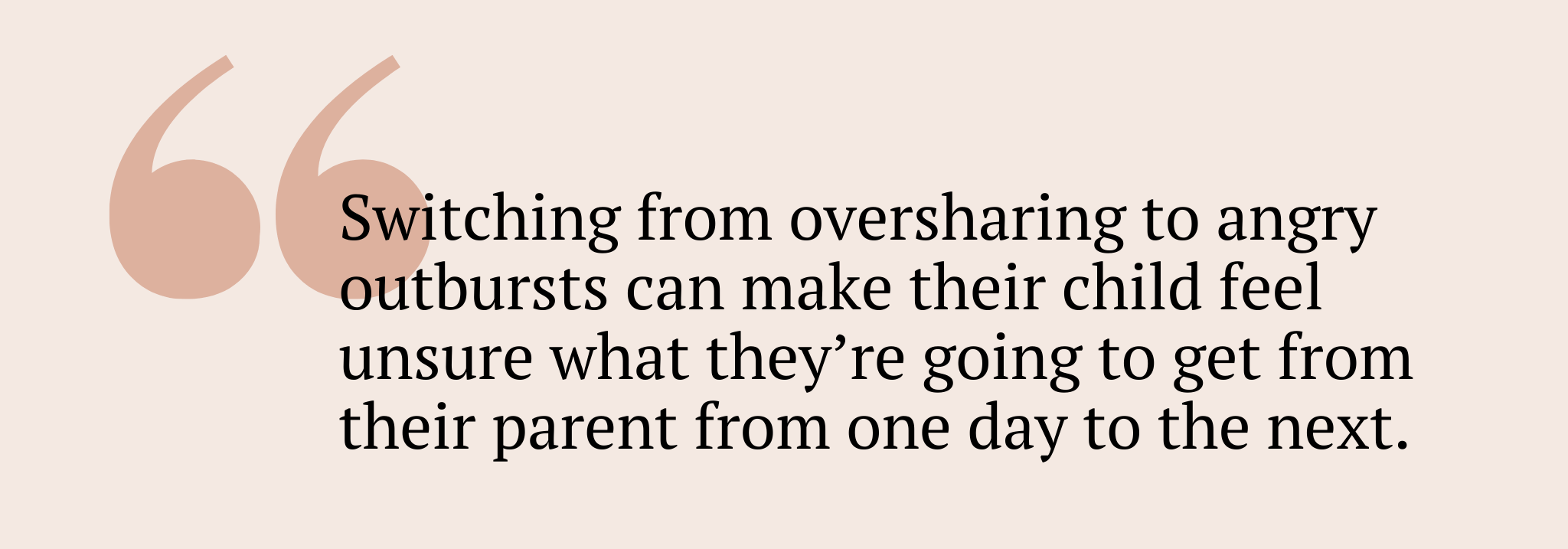Keeping the peace with our parents can feel like walking an emotional tightrope for some of us – and the dynamic doesn’t always change as adults. Here, we explore the impact of having to walk on eggshells around our caregivers, and how to rediscover our footing as we break free from the cycle
Have you ever kept your head down to avoid an uncomfortable or explosive situation? Perhaps, your stomach starts to churn and your breath quickens with the tension in the air. Or maybe you’ve felt cautious about not upsetting someone, unsure how the rest of the day will pan out in the aftermath. If so, you probably understand what it means to ‘walk on eggshells’. But, what does this look like in the context of parenting? And, if you experienced the responsibility of keeping the peace growing up, what is the fallout in adult life?
What is eggshell parenting?
Eggshell parenting is the persistent lack of predictability and stability from a parent (or caregiver) that makes the child feel nervous, overwhelmed, or fearful. These parental inconsistencies can manifest as blowing up over nothing, manipulation tactics, or sharing secrets. Switching from oversharing or demanding emotional support to angry outbursts or tantrums can make their child feel unsure what they’re going to get from their parent from one day to the next.
This term exploded in popularity when a psychologist, Dr Kim Sage, talked about the mental health repercussions of growing up with an ‘eggshell mother’ in a viral video on social media. As Dr Sage explained, emotional unpredictability in the home can lead to anxiety, as well as issues with trust, and a tendency to isolate yourself from others.
With more than 4.6 million views on TikTok, the term has struck a chord with many of us who had to walk on eggshells to keep a parent happy – myself included. Growing up with a parent who struggled with emotional control is something I’ve been aware of for a long time, but exploring this concept has opened my eyes to how this may have felt on an ongoing basis.
The effects of eggshell parenting
Most parents are occasionally inconsistent – we’re all human, after all. However, repeated unpredictability, which can take the form of extreme reactions alongside inappropriate emotional closeness, can create several challenges for children.
They may find it difficult to talk through their feelings out of fear of how the eggshell parent may react, prioritising the parent’s needs over their own, or the child may become hypervigilant. If you always felt on guard as a child, arriving at a place of peace or safety can be hard. To feel secure, the child has to ‘bend backwards’ to fit in with their mum or dad’s impulses, which can feel like a huge emotional burden.
Counsellor Sophie Milburn says that living in an environment where a parent’s behaviour fluctuates unpredictably can lead to this alertness. She adds that this can result in the child constantly “reading the room”, and focusing on the emotional temperature of the home, which can mean problems linger beyond those early years.
“The habit of focusing on everyone else’s feelings can continue into adulthood, where the individual may find themselves trying to validate others’ emotions, while neglecting their needs. This can make it difficult for the person to trust their instincts, or feel secure in their decisions, as they grow older,” Sophie says.
Footprints of walking on eggshells
To investigate the association between mental health symptoms and childhood trauma, researchers analysed 156 people who experienced a lack of predictable caregiving. The study, published in 2022 in the journal Depression and Anxiety, revealed that people who had unpredictable childhoods were statistically more at risk of experiencing anxiety and depression in adulthood.
Sophie, who specialises in anxiety, describes this ripple effect of eggshell parenting. “These individuals often carry deep-rooted fears into adulthood – fear of upsetting others, fear of making mistakes, and a constant hyper-awareness of the emotions and reactions of those around them. They may find themselves constantly evaluating situations and interactions, unsure of how their decisions will be received.”

So, how can this affect day-to-day relationships? Well, avoiding showing emotional vulnerability in fear of upsetting others or worrying about being rejected can trigger a self-protective attachment style. This fear of abandonment can bring about avoidant behaviours, such as discomfort with intimacy and hyper-independence, to prevent getting hurt again.
And, of course, the problematic power dynamics between a child and their parent can persist even when that child grows up. Adult children can find it really difficult to assert themselves, and set boundaries with an eggshell parent, Sophie explains. “These unresolved dynamics can create rifts in the relationship, with the adult child feeling emotionally drained, anxious, or unsure of how to communicate with a parent whose behaviour remains unpredictable.”
Navigating your feelings
Maintaining a relationship with an eggshell parent can feel like being caught between a rock and hard place. You may experience shame about even opening up about this, feeling like you’re blaming your parent, while still needing to process the harmful effects of it.
Navigating this journey isn’t easy, but I’m a huge believer in the idea of sitting with multiple truths. In my therapeutic practice as a hypnotherapist, I often tell my clients to look for the nuance in a situation. For example, it’s possible to recognise that your parent did what they could with the resources they had at the time, and give yourself permission to feel the range of emotions associated with living in an uneasy environment. Not being able to count on your parent in the way you needed (and deserved) can be a painful realisation.
Breaking free from eggshell parenting
Increased self-awareness can bring about change, and one way to break eggshell parenting in adulthood is to understand your limits. Saying ‘no’, and taking good care of your time, is not something to feel bad about. Instead, it’s a way to create healthier patterns of behaviour.
Setting your boundaries by communicating your needs calmly and clearly is key, as is taking care of your emotional needs. Sophie recommends small acts of self-validation as a helpful tip: “Start by acknowledging and trusting your own feelings, independent of the need for approval or validation from others.” Reflecting on how you feel and what you need, even if your parent disapproves, can make it easier to change how you communicate with them.
Sophie adds to this the importance of cultivating positive connections. “Building new, healthier relationships that provide stability and predictability can be a powerful step towards healing.” Feeling deserving of fulfilling relationships can help you move away from negativity into a more self-empowered place. As with everything, healing is multi-layered, but treating yourself with tenderness helps build new, stable ground from which to grow and tread with confidence, instead of walking on eggshells.


Comments